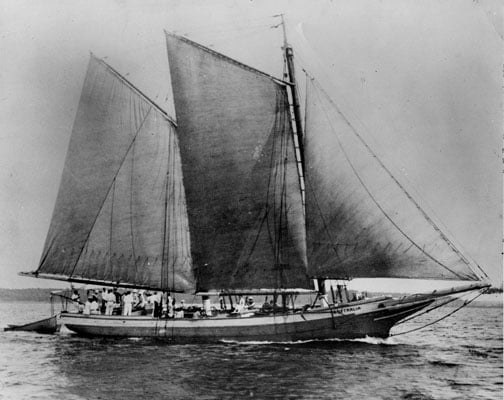The Fourth Man (7)
By:
May 28, 2015

From the nineteen-teens until his death in 1956, American author and explorer John Russell wrote dozens of adventure yarns for such magazines as The Golden Book, Argosy, and The Saturday Evening Post. I first came across “The Fourth Man” (Collier’s, Jan 6. 1917) in The Pocket Book of Adventure Stories (1945, ed. Philip Van Doren Stern), when I was an adolescent in the early ’80s. It’s one of the greatest tales of suspense ever. Enjoy!
“Consider,” urged Dubosc with his quaint touch of pedantry. “Why should you and I fight? We are rational men. We can see this trouble through and win yet. Such weather cannot last forever. Besides, here are only two of us to divide the water now.”
“That is true,” nodded The Parrot. “That is true, isn’t it? Fenayrou kindly leaves us his share. An inheritance — what? A famous idea. I’ll take mine now.”
Dubosc probed him keenly.
“My share, at once, if you please,” insisted Perroquet, with heavy docility. “Afterward, we shall see. Afterward.”
The doctor smiled his grim and wan little smile.

“So be it.”
Without relinquishing the flask he brought out his canvas wallet once more — that wallet which replaced the professional black bag — and rolled out the thimble by some swift sleight of his flexible fingers while he held Perroquet’s glance with his own.
“I will measure it for you.”
He poured the thimbleful and handed it over quickly, and when Perroquet had tossed it off he filled again and again.
“Four — five,” he counted. “That is enough.”
But The Parrot’s big grip closed quietly around his wrist at the last offering and pinioned him and held him helpless.
“No, it is not enough. Now I will take the rest. Ha, wise man! Have I fooled you at last?”
There was no chance to struggle, and Dubosc did not try, only stayed smiling up at him, waiting.
Perroquet took the bottle.
“The best man wins,” he remarked. “Eh, my zig? A bright notion — of yours. The — best —”
His lips moved, but no sound issued. A look of the most intense surprise spread upon his round face. He stood swaying a moment, and collapsed like a huge hinged toy when the string is cut.
Dubosc stooped and caught the bottle again, looking down at his big adversary, who sprawled in brief convulsion and lay still, a bluish scum oozing between his teeth….
“Yes, the best man wins,” repeated the doctor, and laughed as he in turn raised the flask for a draft.
“The best wins!” echoed a voice in his ear.
Fenayrou, writhing up and striking like a wounded snake, drove the knife home between his shoulders.
The bottle fell and rolled to the middle of the platform, and there, while each strove vainly to reach it, it poured out its treasure in a tiny stream that trickled away and was lost.
It may have been minutes or hours later — for time has no count in emptiness — when next a sound proceeded from that frail slip of a raft, hung like a mote between sea and sky. It was a phrase of song, a wandering strain in half tones and fluted accidentals, not unmelodious. The black Canaque was singing. He sang without emotion or effort, quite casually and softly to himself. So he might sing by his forest hut to ease some hour of idleness. Clasping his knees and gazing out into space, untroubled, unmoved, enigmatic to the end, he sang — he sang.
And, after all, the ship came.

She came in a manner befitting the sauciest little tops’l schooner between Nukahiva and the Pelews — as her owner often averred and none but the envious denied — in a manner worthy, too, of that able Captain Jean Guibert, the merriest little scamp that ever cleaned a pearl bank or snapped a cargo of labor from a scowling coast. Before the first whiff out of the west came the Petite Suzanne, curtsying and skipping along with a flash of white frill by her forefoot, and brought up startled and stood shaking her skirts and keeping herself quite daintily to windward.
“And ’ere they are sure enough, by dam!” said the polyglot Captain Jean in the language of commerce and profanity. “Zose passengers for us, hey? They been here all the time, not ten mile off — I bet you, Marteau. Ain’t it ’ell? What you zink, my gar?”
His second, a tall and excessively bony individual of gloomy outlook, handed back the glasses.
“More bad luck. I never approved of this job. And now — see? — we have had our voyage for nothing. What misfortune!”
“Marteau, if that good Saint Pierre gives you some day a gold ’arp still you would holler bad luck — bad job!” retorted Captain Jean. “Do I ’ire you to stand zere and cry about ze luck? Get a boat over, and quicker zan zat!”
M. Marteau aroused himself sufficiently to take command of the boat’s crew that presently dropped away to investigate….
“It is even as I thought,” he called up from the quarter when he returned with his report. “I told you how it would be, Captain Jean.”
“Hey?” cried the captain, bouncing at the rail. “Have you got zose passengers yet, enfant de salaud?”
“I have not,” said Marteau in the tone of lugubrious triumph. There was nothing in the world that could have pleased him quite so much as this chance to prove Captain Jean the loser on a venture. “We are too late. Bad luck, bad luck — that calm. What misfortune! They are all dead!”
“Will you mind your business?” shouted the skipper.
“But still, the gentlemen are dead —”
“What is zat to me? All ze better, they will cost nozing to feed.”
“But how —”
“Hogsheads, my gar,” said Captain Jean paternally. “Zose hogsheads in the afterhold. Fill them nicely with brine, and zere we are!” And, having drawn all possible satisfaction from the other’s amazement, he sprang the nub of his joke with a grin. “Ze gentlemen’s passage is all paid, Marteau. Before we left Sydney, Marteau. I contrac’ to bring back three escape’ convicts, and so by ’ell I do — in pickle! And now if you’ll kindly get zose passengers aboard like I said an’ bozzer less about ze goddam luck, I be much oblige’. Also, zere is no green on my eye, Marteau, and you can dam’ well smoke it!”
Marteau recovered himself with difficulty in time to recall another trifling detail. “There is a fourth man on board that raft, Captain Jean. He is a Canaque — still alive. What shall we do with him?”
“A Canaque?” snapped Captain Jean. “A Canaque! I had no word in my contrac’ about any Canaque…. Leave him zere…. He is only a dam’ nigger. He’ll do well enough where he is.”
And Captain Jean was right, perfectly right, for while the Petite Suzanne was taking aboard her grisly cargo the wind freshened from the west, and just about the time she was shaping away for Australia the “dam’ nigger” spread his own sail of pandanus leaves and twirled his own helm of niaouli wood and headed the catamaran eastward, back toward New Caledonia.
Feeling somewhat dry after his exertion, he plucked at random from the platform a hollow reed with a sharp end and, stretching himself at full length in his accustomed place at the stern, he thrust the reed down into one of the bladders underneath and drank his fill of sweet water….
He had a dozen such storage bladders remaining, built into the floats at intervals above the water line—quite enough to last him safely home again.
RADIUM AGE SCIENCE FICTION: “Radium Age” is HILOBROW’s name for the 1904–33 era, which saw the discovery of radioactivity, the revelation that matter itself is constantly in movement — a fitting metaphor for the first decades of the 20th century, during which old scientific, religious, political, and social certainties were shattered. This era also saw the publication of genre-shattering writing by Edgar Rice Burroughs, Sax Rohmer, E.E. “Doc” Smith, Jack London, Arthur Conan Doyle, Aldous Huxley, Olaf Stapledon, Karel Čapek, H.P. Lovecraft, Charlotte Perkins Gilman, Yevgeny Zamyatin, Philip Gordon Wylie, and other pioneers of post-Verne/Wells, pre-Golden Age “science fiction.” More info here.
READ GORGEOUS PAPERBACKS: HiLoBooks has reissued the following 10 obscure but amazing Radium Age science fiction novels in beautiful print editions: Jack London’s The Scarlet Plague, Rudyard Kipling’s With the Night Mail (and “As Easy as A.B.C.”), Arthur Conan Doyle’s The Poison Belt, H. Rider Haggard’s When the World Shook, Edward Shanks’ The People of the Ruins, William Hope Hodgson’s The Night Land, J.D. Beresford’s Goslings, E.V. Odle’s The Clockwork Man, Cicely Hamilton’s Theodore Savage, and Muriel Jaeger’s The Man with Six Senses. For more information, visit the HiLoBooks homepage.
SERIALIZED BY HILOBOOKS: Jack London’s The Scarlet Plague | Rudyard Kipling’s With the Night Mail (and “As Easy as A.B.C.”) | Arthur Conan Doyle’s The Poison Belt | H. Rider Haggard’s When the World Shook | Edward Shanks’ The People of the Ruins | William Hope Hodgson’s The Night Land | J.D. Beresford’s Goslings | E.V. Odle’s The Clockwork Man | Cicely Hamilton’s Theodore Savage | Muriel Jaeger’s The Man With Six Senses | Jack London’s “The Red One” | Philip Francis Nowlan’s Armageddon 2419 A.D. | Homer Eon Flint’s The Devolutionist | W.E.B. DuBois’s “The Comet” | Edgar Rice Burroughs’s The Moon Men | Charlotte Perkins Gilman’s Herland | Sax Rohmer’s “The Zayat Kiss” | Eimar O’Duffy’s King Goshawk and the Birds | Frances Hodgson Burnett’s The Lost Prince | Morley Roberts’s The Fugitives | Helen MacInnes’s The Unconquerable | Geoffrey Household’s Watcher in the Shadows | William Haggard’s The High Wire | Hammond Innes’s Air Bridge | James Branch Cabell’s Jurgen | John Buchan’s “No Man’s Land” | John Russell’s “The Fourth Man” | E.M. Forster’s “The Machine Stops” | John Buchan’s Huntingtower | Arthur Conan Doyle’s When the World Screamed | Victor Bridges’ A Rogue By Compulsion | Jack London’s The Iron Heel | H. De Vere Stacpoole’s The Man Who Lost Himself | P.G. Wodehouse’s Leave It to Psmith | Richard Connell’s “The Most Dangerous Game” | Houdini and Lovecraft’s “Imprisoned with the Pharaohs” | Arthur Conan Doyle’s “The Sussex Vampire”.
ORIGINAL FICTION: HILOBROW has serialized three novels: James Parker’s The Ballad of Cocky The Fox (“a proof-of-concept that serialization can work on the Internet” — The Atlantic); Karinne Keithley Syers’s Linda Linda Linda (which includes original music); and Robert Waldron’s roman à clef The School on the Fens. We also publish original stories and comics. These include: Matthew Battles’s stories “Gita Nova“, “Makes the Man,” “Imago,” “Camera Lucida,” “A Simple Message”, “Children of the Volcano”, “The Gnomon”, “Billable Memories”, “For Provisional Description of Superficial Features”, “The Dogs in the Trees”, “The Sovereignties of Invention”, and “Survivor: The Island of Dr. Moreau”; several of these later appeared in the collection The Sovereignties of Invention | Peggy Nelson’s “Mood Indigo“, “Top Kill Fail“, and “Mercerism” | Annalee Newitz’s “The Great Oxygen Race” | Flourish Klink’s Star Trek fanfic “Conference Comms” | Charlie Mitchell’s “A Fantasy Land” | Charlie Mitchell’s “Sentinels” | Joshua Glenn’s “The Lawless One”, and the mashup story “Zarathustra vs. Swamp Thing” | Adam McGovern and Paolo Leandri’s Idoru Jones comics | John Holbo’s “Sugarplum Squeampunk” | “Another Corporate Death” (1) and “Another Corporate Death” (2) by Mike Fleisch | Kathryn Kuitenbrouwer and Frank Fiorentino’s graphic novel “The Song of Otto” (excerpt) | John Holbo’s graphic novel On Beyond Zarathustra (excerpt) | “Manoj” and “Josh” by Vijay Balakrishnan | “Verge” by Chris Rossi, and his audio novel Low Priority Hero | EPIC WINS: THE ILIAD (1.408-415) by Flourish Klink | EPIC WINS: THE KALEVALA (3.1-278) by James Parker | EPIC WINS: THE ARGONAUTICA (2.815-834) by Joshua Glenn | EPIC WINS: THE MYTH OF THE ELK by Matthew Battles | TROUBLED SUPERHUMAN CONTEST: Charles Pappas, “The Law” | CATASTROPHE CONTEST: Timothy Raymond, “Hem and the Flood” | TELEPATHY CONTEST: Rachel Ellis Adams, “Fatima, Can You Hear Me?” | OIL SPILL CONTEST: A.E. Smith, “Sound Thinking | LITTLE NEMO CAPTION CONTEST: Joe Lyons, “Necronomicon” | SPOOKY-KOOKY CONTEST: Tucker Cummings, “Well Marbled” | INVENT-A-HERO CONTEST: TG Gibbon, “The Firefly” | FANFICTION CONTEST: Lyette Mercier’s “Sex and the Single Superhero”
